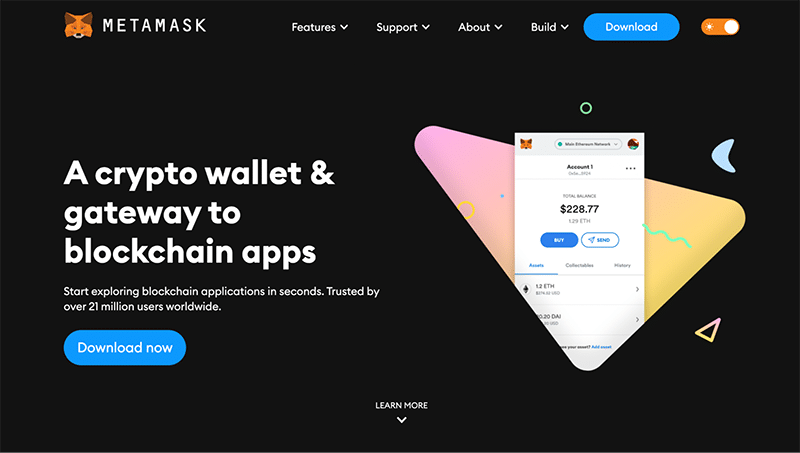Polygon describes itself as ‘Ethereum’s internet of blockchains,’ a layer-2 scaling solution aiming to solve Ethereum’s burdening slowness and costly transactions.
Unlike its predecessor, Polygon utilizes the proof-of-stake consensus mechanisms helping it to achieve tremendous scalability, massive energy reduction, and cost-effectiveness for users. It is one of the most well-received platforms for building high-performance blockchains and dApps (decentralized applications).
MATIC (named after Polygon’s old name, Matic Network) is the network’s utility token for paying gas fees, staking, and governance. This cryptocurrency is the 17th most traded on the markets, according to CoinMarketCap, exemplifying Polygon’s prominence.
Of course, trading MATIC requires the presence of a crypto wallet for storage purposes. Before going into the top 5 to use in this regard, let’s explore the significance of wallets and the types you’ll encounter.
The types of crypto wallets
A crypto wallet’s main job is to receive and store a wide range of cryptocurrencies from different blockchains. They come in various forms, such as browser interfaces, mobile apps, desktop programs, and USB drives.
However, the main concern with is security. Since cryptocurrencies are entirely decentralized, any loss or theft of coins is usually irrecoverable. The primary two types of wallets are classified as ‘cold’ or hardware (not connected to the internet) and ‘hot’ or software (connected to the internet).
Cold wallets are considered the most secure as the storage of your coins (which is usually on a physical USB device) is not dependent on using an internet connection. Moreover, the private keys (non-custodial), the most sensitive data for any crypto holder, are kept with the user rather than a third-party service.
Conversely, hot wallets are far less secure and are, therefore, easier to hack since they are always connected online. Additionally, traders don’t keep their private keys. Yet, such wallets are the easiest to access, making them quite convenient if you regularly exchange coins.
Plus, there is typically no cost to using them, unlike cold ones. The latter is more suitable for long-term storage and those who own substantial amounts of crypto.
Presently, 66 wallet applications can store MATIC. However, for your convenience, we’ve narrowed down this list to the best 5.
Ledger

Ledger is presently the only hardware wallet supporting MATIC natively (with Trezor, one needs third-party software like MetaMask). We ranked it first as it’s technically the most secure.
Ledger, along with Trezor, is the most prominent brand in crypto hardware wallets and was first launched in 2016. Presently, the company has three USB device wallets – Nano X, Nano S, and Nano S Plus – with prices ranging from $59 to $149, cheaper than Trezor’s Model T.
These products have similar features in terms of simplicity, security, and the number of apps you can install. The distinctions boil down to Bluetooth presence, amount of battery power, weight, and screen size.
Regardless, Ledger’s products come in a stainless steel cover and support over 1000 cryptocurrencies.
MetaMask

MetaMask is one of the most popular open-source decentralized software crypto wallets on the market. This service was launched in 2016 by ConsenSys, a blockchain software tech company. According to MetaMask’s website, more than 21 million monthly customers use its facility.
MetaMask works with Ethereum and, of course, many other Ethereum-compatible blockchains like Polygon. As a non-custodial wallet, users retain their private keys, which they can securely store and manage.
With MetaMask, you can send tons of Ethereum-based tokens and connect to a host of dApps like exchanges, lending platforms, and NFT (non-fungible token) marketplaces. You can use this MetaMask on a compatible web browser or as an Android/iOS mobile app.
TrustWallet

Trust Wallet is another popular non-proprietary decentralized software wallet. Trust is primarily used by those storing Ethereum and Binance Smart Chain-based tokens. It works as a mobile application (for Android and iOS) and as a special dApp browser.
Trust Wallet is compatible with 53 blockchains, combining to thousands of digital assets which can be kept. Another beneficial feature of Trust is you can keep NFTs using the token standards of Ethereum and BSC (Binance Smart Chain).
Additionally, you can earn rewards by staking Binance Coin, TRON, Tezos, Cosmos, Terra, VeChain, Callisto, Osmosis, Kava, TomoChain, IoTeX, and Algorand, with yields ranging from 4.1% to 84%.
Coinbase Wallet

While Coinbase is one of the most prevalent crypto exchanges, it also has a separate non-custodial wallet service of its namesake, launched in 2018. This means you can buy MATIC without needing to open a Coinbase account.
Here, you can purchase, send, and store hundreds of digital currencies. Users can also browse a plethora of decentralized applications and keep all their Ethereum-based or ERC721 NFT tokens on this wallet.
Plus, you can earn from staking rewards and participate in several DeFi (decentralized finance) activities like borrowing crypto. Coinbase Wallet is available as a browser extension or an Android/iOS mobile app.
MyEtherWallet

While MyEtherWallet (MEW) was established in 2015, it only began supporting Polygon in July 2021. As its name suggests, MEW is another prominent open-source non-custodial wallet service for storing and trading Ethereum-based tokens (including NFTs).
However, MEW is technically not a wallet per se but a client-side interface which simply means you can store your coins on your personal computer rather than online.
With MEW, you can explore many dApps and partake in other multi-faceted integration possibilities. For instance, its affiliated hardware wallets include Trezor and Ledger, which is one way to enter MEW’s portal.
You can also access it via an iOS/Android mobile application or a browser extension like MetaMask.
Curtain thoughts
While cryptocurrencies are generally heralded as a revolutionary financial invention, using crypto wallets safely comes with a lot of responsibility.
Of course, it is hard to universally agree on which is the best platform to store MATIC as it depends on features, user-friendliness, and whether we’re dealing with hot or cold storage. Nonetheless, we hope readers will get an insight into the vastness of Polygon’s ecosystem of decentralized applications.




